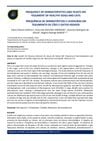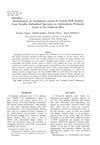 14 citations,
January 2008 in “Dermatology”
14 citations,
January 2008 in “Dermatology” Vitamin D made by the skin plays a role in immune defense and skin health, and more research is needed to understand its full effects.
 3 citations,
August 2017 in “PubMed”
3 citations,
August 2017 in “PubMed” A man got a scalp infection from synthetic hair implants because the procedure wasn't done by a doctor and was poorly managed.
 June 2023 in “Deleted Journal”
June 2023 in “Deleted Journal” Healthy dogs and cats can carry and spread skin infections without showing symptoms.
 January 2024 in “American journal of clinical dermatology”
January 2024 in “American journal of clinical dermatology” Ritlecitinib is safe and well-tolerated for treating alopecia areata in patients aged 12 and older.
3 citations,
August 2021 in “European journal of medical research” Microbial biofilms may cause red scrotum syndrome.
Polyglutamic acid is a valuable, sustainable ingredient for skincare and haircare products.
 70 citations,
February 2019 in “The journal of immunology/The Journal of immunology”
70 citations,
February 2019 in “The journal of immunology/The Journal of immunology” Short-chain fatty acids from *Cutibacterium acnes* cause skin inflammation, contributing to acne.
 8 citations,
January 2007 in “International journal of experimental pathology”
8 citations,
January 2007 in “International journal of experimental pathology” Hairless HRS/J mice resist Bacillus anthracis skin infections due to high numbers of immune cells, not because they lack hair follicles.
241 citations,
August 2005 in “Journal of Investigative Dermatology Symposium Proceedings” Dandruff and seborrheic dermatitis are caused by yeast feeding on scalp oils, leading to irritation and flaking.
 39 citations,
January 2019 in “Journal of Dermatological Treatment”
39 citations,
January 2019 in “Journal of Dermatological Treatment” Ketoconazole cream is effective for skin conditions like seborrheic dermatitis and may help with hair loss and other skin issues, with generally mild side effects.
 December 2021 in “Revista da Sociedade Portuguesa de Dermatologia e Venereologia”
December 2021 in “Revista da Sociedade Portuguesa de Dermatologia e Venereologia” Imbalance in scalp bacteria can affect hair and scalp health, potentially leading to conditions like hair loss, psoriasis, and dandruff.
 11 citations,
February 2021 in “Biomedicines”
11 citations,
February 2021 in “Biomedicines” Bacteria in our hair can affect its health and growth, and studying these bacteria could help us understand hair diseases better.
 March 2021 in “Actas Dermo-Sifiliográficas”
March 2021 in “Actas Dermo-Sifiliográficas” The microbiome may be linked to hair loss and could be a target for new treatments.
 August 2023 in “Processes”
August 2023 in “Processes” Fermenting Dendrobium officinale with Lactobacillus reuteri CCFM8631 increases its skin care benefits.
3 citations,
September 2021 in “BioEssays” Dandruff might be caused by changes in how hair follicles naturally release oils and an immune response to this imbalance.
 2 citations,
January 2019 in “Indian Dermatology Online Journal”
2 citations,
January 2019 in “Indian Dermatology Online Journal” The congress concluded that misuse of antifungal drugs in South Asia has led to widespread treatment failure, and new approaches and regional cooperation are needed.
 128 citations,
September 2011 in “British Journal of Dermatology”
128 citations,
September 2011 in “British Journal of Dermatology” Obesity is linked to various skin problems and may increase the risk of skin cancer.
 January 2025 in “AAPS PharmSciTech”
January 2025 in “AAPS PharmSciTech” Transethosomes improve drug delivery through the skin and show promise for treating various conditions.
 23 citations,
January 2005 in “Nihon Ishinkin Gakkai zasshi”
23 citations,
January 2005 in “Nihon Ishinkin Gakkai zasshi” Nested PCR can reliably identify fungal infections when traditional methods fail.
 78 citations,
October 2020 in “Experimental Dermatology”
78 citations,
October 2020 in “Experimental Dermatology” Hidradenitis suppurativa is caused by genetic factors, inflammation, bacteria, hormones, and lifestyle factors like obesity and smoking.
 September 2023 in “Mağallaẗ baġdād li-l-ʿulūm”
September 2023 in “Mağallaẗ baġdād li-l-ʿulūm” Microbial communities in Duku plant roots vary between wet and dry habitats, affecting plant health.
 28 citations,
January 2000 in “Medical Mycology”
28 citations,
January 2000 in “Medical Mycology” Fungal infections in lab animals can interfere with research.
 June 2018 in “Journal of Clinical Periodontology”
June 2018 in “Journal of Clinical Periodontology” Finasteride may cause gum side effects in some patients.
8 citations,
March 2010 in “Chinese medical journal/Chinese Medical Journal” Malassezia infection may cause refractory acne, and antifungal treatments can help.
 December 2008 in “Enzyme and Microbial Technology”
December 2008 in “Enzyme and Microbial Technology” New patents include innovations in skin and hair care, disease treatment, plant stress tolerance, and protein purification.
2 citations,
February 2024 in “International journal of molecular sciences” Gut health affects skin diseases, and probiotics might help.
February 2024 in “International journal of molecular sciences” Type 3 Innate Lymphoid Cells help maintain skin health and balance, and are involved in skin diseases and healing.
 113 citations,
June 2019 in “F1000Research”
113 citations,
June 2019 in “F1000Research” Scarless healing is complex and influenced by genetics and environment, while better understanding could improve scar treatment.
20 citations,
August 2005 in “The Journal of laboratory and clinical medicine” Mice with damaged skin or hair follicles are more susceptible to anthrax infection.
5 citations,
September 2022 in “Frontiers in Nutrition” Gut bacteria differences may help diagnose and treat Alopecia areata.




















